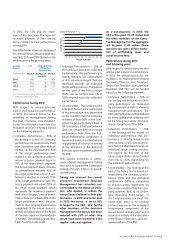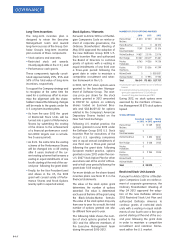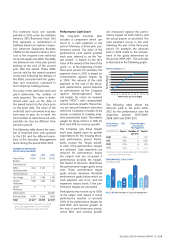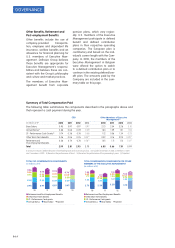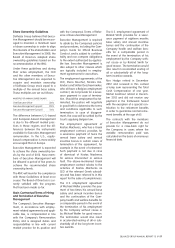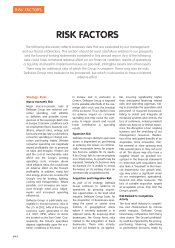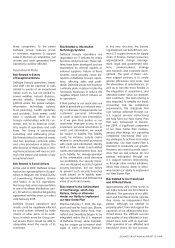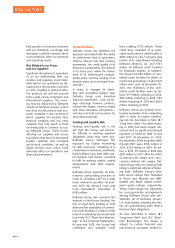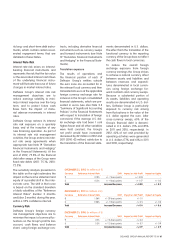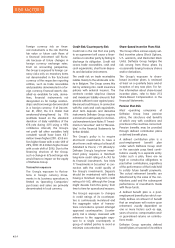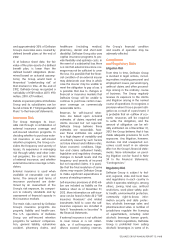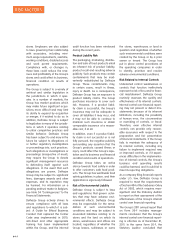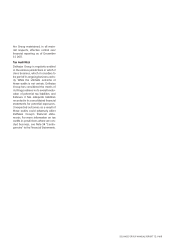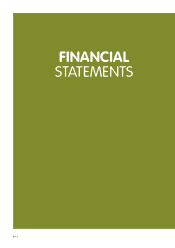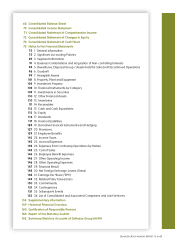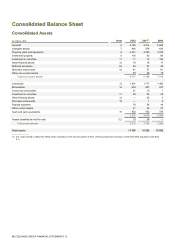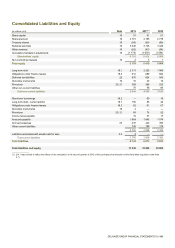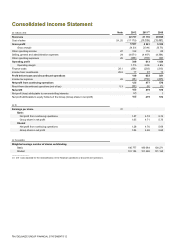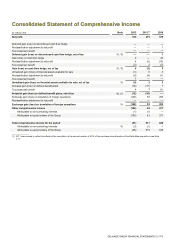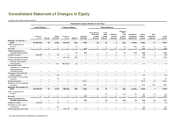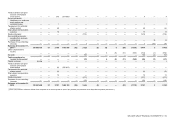Food Lion 2012 Annual Report Download - page 65
Download and view the complete annual report
Please find page 65 of the 2012 Food Lion annual report below. You can navigate through the pages in the report by either clicking on the pages listed below, or by using the keyword search tool below to find specific information within the annual report.DELHAIZE GROUP ANNUAL REPORT ‘12 // 63
and approximately 30% of Delhaize
Group’s associates were covered by
defined benefit plans at the end of
2012.
If, at balance sheet date, the fair
value of the plan assets of a defined
benefit plan, is lower than the
defined benefit obligations (deter-
mined based on actuarial assump-
tions), the Group would bear a
theoretical ”underfunding risk” at
that moment in time. At the end of
2012, Delhaize Group recognized a
net liability of €129 million (2011: €90
million; 2010: €79 million).
Details on pension plans at Delhaize
Group and its subsidiaries can be
found in Note 21.1 ”Employee Benefit
Plans” to the Financial Statements.
Insurance Risk
The Group manages its insur-
able risk through a combination of
external insurance coverage and
self-insured retention programs. In
deciding whether to purchase exter-
nal insurance or use self-insured
retention programs, the Group con-
siders the frequency and severity of
losses, its experience in managing
risk through safety and other inter-
nal programs, the cost and terms
of external insurance, and whether
external insurance coverage is man-
datory.
External insurance is used when
available at reasonable cost and
terms. The amount and terms of
insurance purchased are deter-
mined by an assessment of the
Group’s risk exposure, by compari-
son to industry standards and by
assessment of financial capacity in
the insurance markets.
The main risks covered by Delhaize
Group’s insurance programs are
property, liability and health-care.
The U.S. operations of Delhaize
Group use self-insured retention
programs for workers’ compensa-
tion, general liability, automotive
accident, pharmacy claims, and
healthcare (including medical,
pharmacy, dental and short-term
disability). Delhaize Group also uses
captive insurance programs to pro-
vide flexibility and optimize costs. In
the event of a substantial loss there
is a risk that external insurance cov-
erage may not be sufficient to cover
the loss. It is possible that the finan-
cial condition of an external insurer
may deteriorate over time in which
case the insurer may be unable to
meet the obligation to pay a loss. It
is possible that due to changes in
financial or insurance markets that
Delhaize Group will be unable to
continue to purchase certain insur-
ance coverage on commercially
reasonable terms.
Reserves for self-insured reten-
tions are based upon actuarial
estimates of claims reported and
claims incurred but not reported.
Delhaize Group believes these
estimates are reasonable, how-
ever these estimates are subject
to a high degree of variability and
uncertainty caused by such factors
as future interest and inflation rates,
future economic conditions, litiga-
tion and claims settlement trends,
legislative and regulatory changes,
changes in benefit levels and the
frequency and severity of incurred
but not reported claims. It is possi-
ble that the final resolution of some
claims may require Delhaize Group
to make significant expenditures in
excess of existing reserves.
Self-insurance provisions of €142 mil-
lion are included as liability on the
balance sheet as of December 31,
2012. More information on self-insur-
ance can be found in Note 20.2 “Self
Insurance Provisions” and related
investments held to cover the self-
insurance exposure are included in
Note 11 ”Investments in Securities” to
the Financial Statements.
If external insurance is not sufficient
to cover losses or is not collect-
able, or if self-insurance expen-
ditures exceed existing reserves,
the Group’s financial condition
and results of operation may be
adversely affected.
Compliance
and Regulatory Risks
Litigation Risk
From time to time, Delhaize Group
is involved in legal actions, includ-
ing matters involving personnel and
employment issues, personal injury,
antitrust claims and other proceed-
ings arising in the ordinary course
of business. The Group regularly
reviews its exposure to the claims
and litigation arising in the normal
course of operations. It recognizes a
provision when it has a present obli-
gation as a result of a past event, it
is probable that an outflow of eco-
nomic resources will be required
to settle the obligation, and the
amount of obligation can be reli-
ably estimated. As of December 31,
2012 the Group believes that it has
made adequate provisions for such
exposures. Any litigation, however,
involves risk and unexpected out-
comes could result in an adverse
effect on the Group’s financial state-
ments. More information on pend-
ing litigation can be found in Note
34 to the Financial Statements,
”Contingencies.”
Regulatory Risk
Delhaize Group is subject to fed-
eral, regional, state and local laws
and regulations in each country in
which it operates relating to, among
others, zoning, land use, antitrust
restrictions, work place safety, pub-
lic health, environmental protection,
community right-to-know, infor-
mation security and data protec-
tion, alcoholic beverage sales and
pharmaceutical sales. A number of
jurisdictions regulate the licensing
of supermarkets, including retail
alcoholic beverage license grants.
Under certain regulations, Delhaize
Group is prohibited from selling
alcoholic beverages in some of its


